
Born in 1970, sales operations was originally described as “all the nasty number things that you don’t want to do, but need to do to make a great sales force”.
Sales is moving from paper rolodexes into the world of AI, automation and cloud computing. With it comes more nasty number things than ever before, making operations staff a vital part of the sales team.

Working in sales operations, you’re tasked with optimizing the team’s processes, maintaining reports, overseeing the sales data, and implementing new sales productivity software like email automation and contract management. As the technical and analytical arm of the team, sales ops managers are familiar with complex datasets and every facet of the company’s CRM.
According to Harvard Business Review, sales ops will:
- Oversee sales performance analyses and reporting, territory alignment, and customer profiling and targeting activities.
- Administer quarterly sales incentive compensation plans and the goal setting process.
- Manage sales force automation and CRM systems and processes.
- Provide data, analyses, modeling, and reporting to support sales force quarterly business reviews.
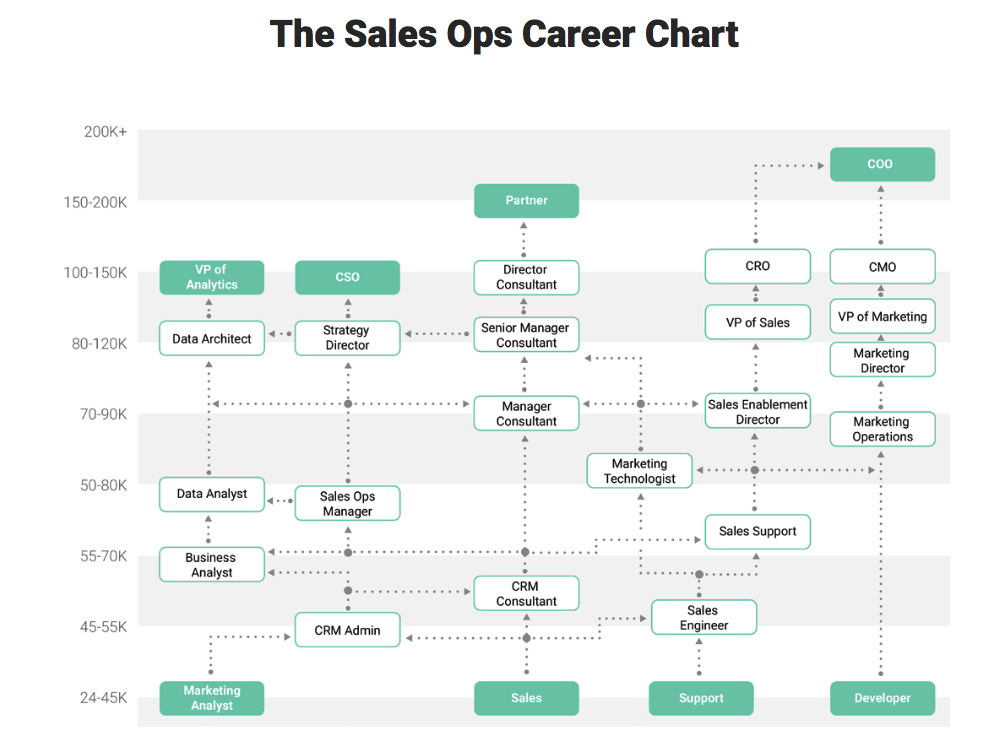
A career in sales operations
Typically, sales ops derives from marketing analyst, sales, and support roles and requires experience as a CRM admin or sales engineer as a prerequisite.
In an earlier Process Street post, we took a look at how you can progress from business analyst to business architect. The sales ops career is closely related to business analyst — it involves process optimization and technological implementation — but it is focused on the performance and productivity of the sales team specifically.
Harvard Business Review divides sales ops staff into roughly two abstract halves:
Strategy skills
The strategy half of the job requires a ‘big picture’ attitude because it concerns things like long-term goals, team size, and high-level process design. The best fit for the position is someone with analysis and design expertise, creative problem-solving skills, and strong project management and collaborative experience
Operations skills
The operations half of the job requires a detail-oriented approach. In your ‘strategy’ tasks, you’ll define the rough parameters of sales operations, but you also need the knowledge and experience to execute on the details. “Exactly how is the task expected to be done?”, “How much compensation should be offered as part of a sales competition?”, etc.
The most in-demand skills for sales operations
Do you want to go down the sales ops path from a sales, support, or marketing analyst role? In this post, we’ll look at some recommendations for areas to focus on, starting with data on the top responsibilities employers are looking for when hiring sales ops staff.

Top skills for early-stage sales ops:
1. Salesforce
2. Excel
3. Communication
4. Finance
Top skills for mid-stage sales ops:
1. Communication
2. Salesforce
3. Excel
4. Project management
Top skills for late-stage sales ops:
1. Strategy
2. MBA
3. Salesforce
4. Marketo
From this data and the HBR outline of the two halves of sales operations, it’s clear that the best fit for the job is someone with a combination of operational expertise and strong strategic thinking, with the latter trait getting more important with seniority.
“The right person to lead sales operations is someone who respects both the analysis/design and the process/detail mindset, who can envision the business and technology future, and who can work with leaders across the organization, as well as with external partners, to enable ongoing sales force success.” — Sally E. Lorimer
Here’s some ideas for how you can hone these areas and level up your career in sales operations.
Get at the front lines of sales (for 10% of the time)
A potential sales ops manager that doesn’t understand the real-world processes behind sales won’t be able to design accurate and usable processes, or understand the struggles of the sales team that need to be resolved.
For this reason, Marissa White from Sales Ops Help recommends getting an accurate impression of actually selling by asking your manager to be involved with a sales project for 10% of your time.
“For those who perhaps have a more administrative role it would be good to spend some time in that world […] Most managers will welcome the chance to develop your skills and help your career ambitions. I’d also suggest to ask to shadow some sales meetings. This will give you a good feel for the cadence of the business and the atmosphere.”
Any doubts about how your CRM works (likely Salesforce, owing to the enterprise need for sales ops) will be ironed out in practice, which help you skill up one of the most consistently in-demand areas of knowledge for sales ops staff.
Learn process management skills
Experience with process management is essential for sales operations because you’ll be expected to design and optimize workflows. Not only that, you’ll come up with your own recurring processes that ensure you can track and report on sales activity.
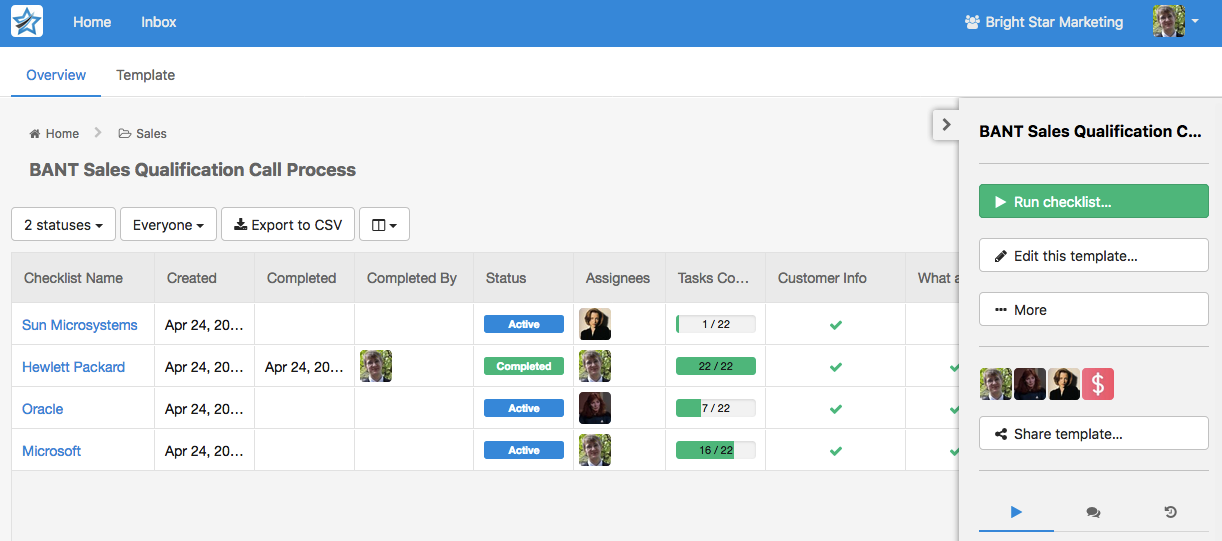
You can make a start and prepare for the role by mapping your own organization’s sales processes, using this template pack as inspiration. To get started with general business process management theory and to learn how to create and optimize processes, you can download our Complete Guide to Business Process Management for free here, and check out these free courses on BPM.
Become a Salesforce expert
Salesforce holds the biggest share of the CRM market at 18.4% — 6.3% more than second-place SAP. And, that share seems to be growing as the other leading competitors’ grasp weakens.
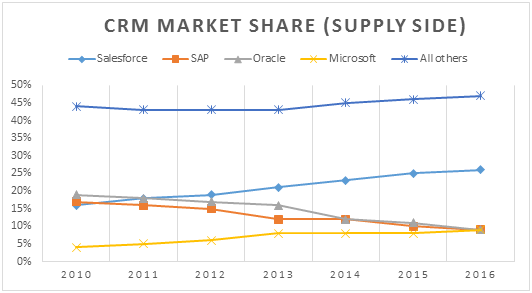
This makes Salesforce skills a safe bet, especially when you consider how it’s constantly one of the top in-demand skills for sales operations. Build on your existing CRM skills by using Salesforce’s own training software Trailhead — there are plenty of courses specifically for sales operations.
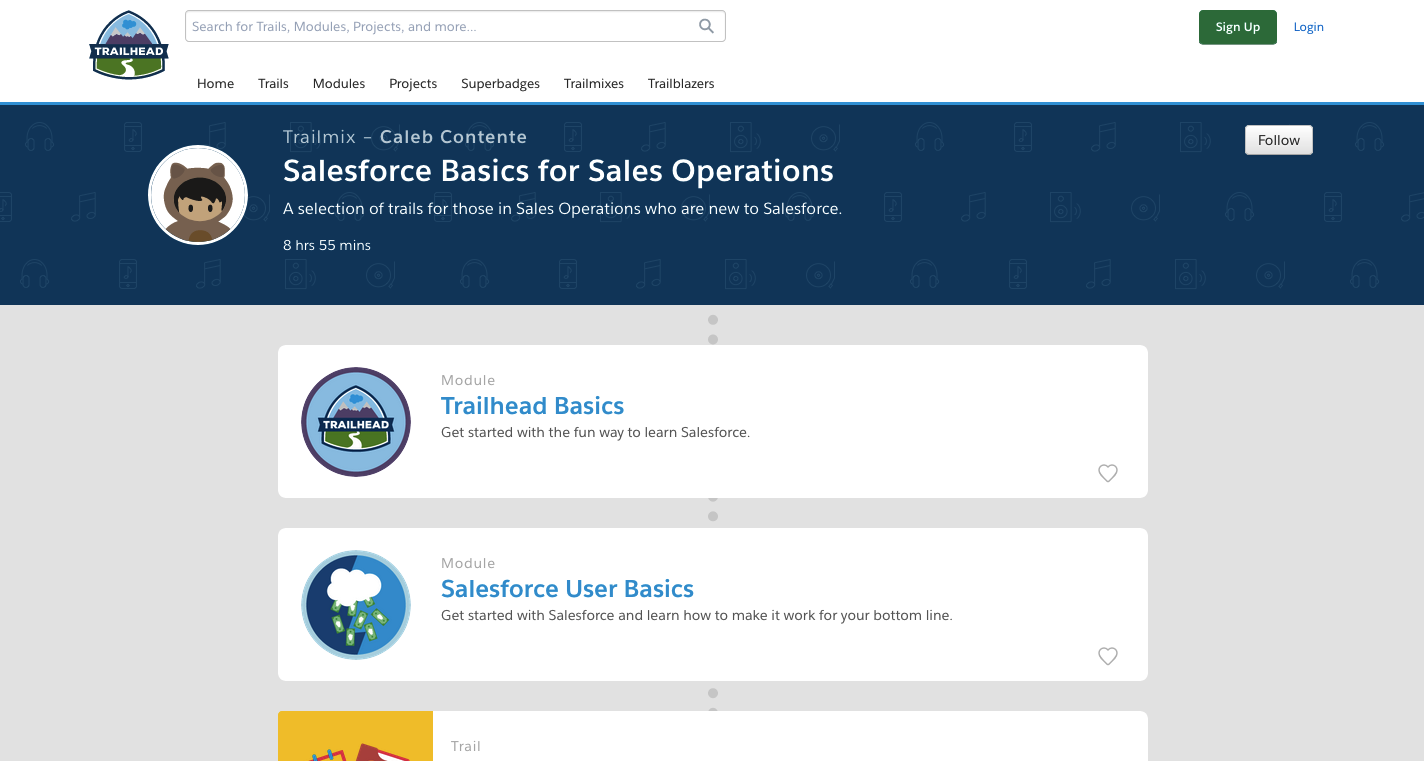
Some of the sales operations courses to look at in Trailhead include:
- Drive Sales with Operational Excellence
- Sales Operations SFDC Training
- Sales Operations for the Admin
- Account Data Strategies
- Manage Your Sales Operations
Boost your Excel skills

Excel is such a desirable skill for sales operations because of the tool’s power and prevalence. It’s likely that every office has access to Excel — especially the bigger ones that need sales ops. Plus, as SiriusDecisions says, “there’s no easier way to perform ad hoc data analysis than with Excel. Even a novice user with basic skills and determination can reduce huge data sets into simple, striking, insightful, visually stunning analysis”. This makes Excel good as a tool to do quick calculations and predictions and useful for routine, recurring reports.
The most likely use for Excel from a sales operations perspective is to create and analyze pivot tables.
Pivot tables let you sort and transform data into views, similar to something like Airtable or a database. To learn how to create and manipulate pivot tables, you can see this guide from Yesware and this general guide to pivot tables from ExcelJet.
Up your integration game with Zapier
Do you wish you could integrate your favorite tools, but they don’t have all have native integrations? With Zapier, you can build you own integrations between over 1,000 platforms including Salesforce, Marketo, and Excel. This means you can set up vital time-saving workflows — called zaps — without needing to call in a developer because the whole thing is code-free.
For example, you could create and assign checklists to your team when something happens in Salesforce:
Or push reporting data into Excel automatically:
You could even build reports while you go, using CRM data:
At Process Street, our operations run on the power of hundreds of zaps. We use Zapier to populate and maintain our CRM, generate sales proposals, and send contracts. If you can’t do what you need with a native integration, it’s likely Zapier has got you covered. To see more use cases for Zapier, check out this post — it even has a specific section for sales integrations.
Convince management of the benefit of sales ops
If your organization doesn’t have the awareness of what sales ops is, you’re unlikely to be able to move your career in that direction without switching jobs. Without sales ops, a sales manager of reasonably-sized team will already feel the need for someone to oversee and facilitate the team’s productivity, so if there’s an opportunity you can use that need to your advantage.
This might mean doing research, finding case studies, and explaining what sales ops actually is to someone who may have presumptions.
We’ve not yet reached a place where Sales Operations is a clearly-defined practice, with well-established areas of focus and documented standards and practices. So while many more companies are now buying into the overall promise of Sales Ops, only a small percentage of those will actually know how to make it happen. — SellingBrew
Here are some suggested resources you can use:
- 2016 Sales Operations Trends Study
- Study: 5 Places Sales Operations is Optimizing for Productivity
- The Rising Importance of Sales Ops
- How Sales Operations Can Grow Your Business
- Why Modern Businesses Need Sales Operations
Stay up to date with developments in the sales automation world
“You’ll have to take responsibility for your own professional development, vet the available training options and educational resources, and ask for what you need”, writes SellingBrew in an article warning about the realities of sales ops. And that doesn’t just mean that you need to actively improve your skills. It also means staying on top of the industry, since sales ops has close ties with software.
News sites like CRN and HBR are good for an aggregated list of goings-on, but you can also go right to the source by following new publications from Gartner and Forrester, and attending conferences like Dreamforce.
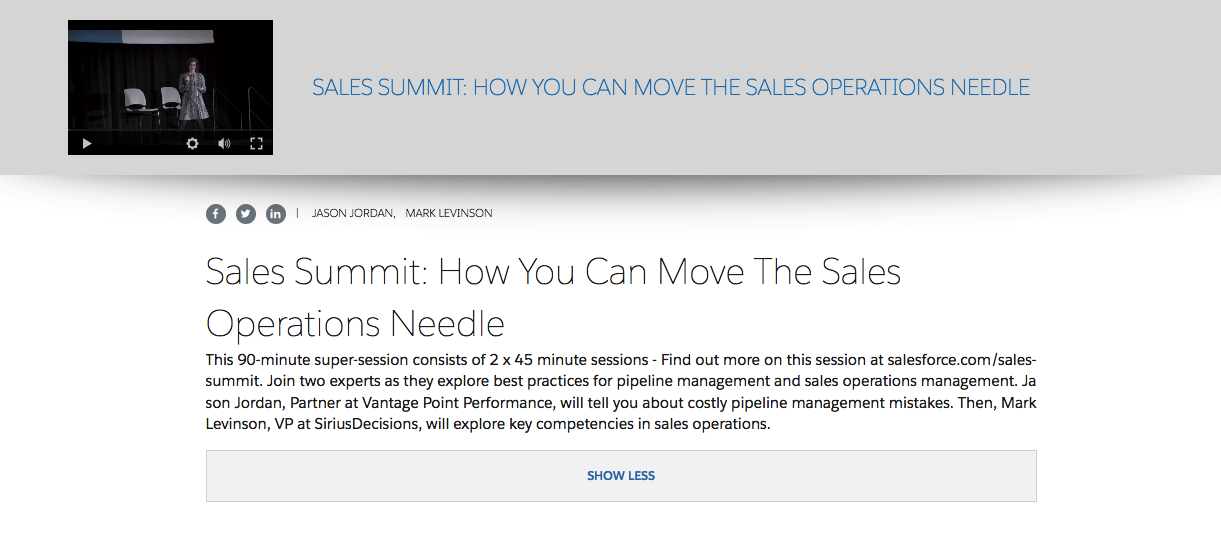
Also don’t forget to check on the release blogs of the tools you use, like Salesforce’s. These will make you aware of new features and keep your skill level with the tool up.
I hope this post has given you a push in the right direction as to what to learn next. If there’s something important you think this article is missing, let me know in the comments.







 Workflows
Workflows Projects
Projects Data Sets
Data Sets Forms
Forms Pages
Pages Automations
Automations Analytics
Analytics Apps
Apps Integrations
Integrations
 Property management
Property management
 Human resources
Human resources
 Customer management
Customer management
 Information technology
Information technology



Benjamin Brandall
Benjamin Brandall is a content marketer at Process Street.